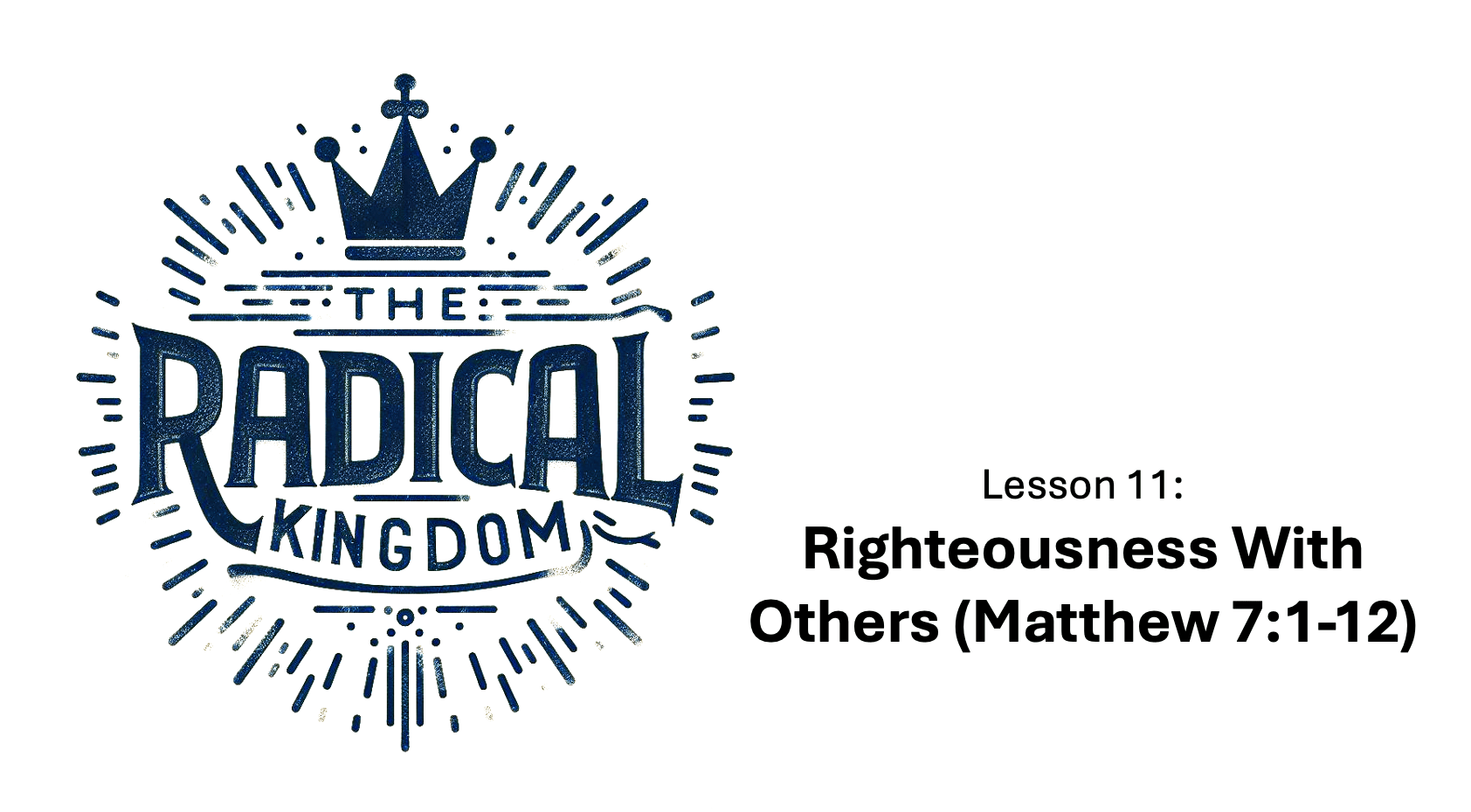Downloadable Files:
Text:
The Radical Kingdom
Lesson 8: Practicing Righteousness, Part 2 (Matthew 6:9-18)
Jesus has challenged His followers to leave ritualistic righteousness behind that would seek any kind of self-glorification. Instead, Jesus has urged His followers to practice true righteousness that is focused on pleasing God and bringing glory to Him, particularly addressing giving to the poor and praying (Matthew 6:1-8). Jesus builds on this by continuing to demonstrate how His followers should practice their righteousness (6:9-18).
Pray Like This (Matthew 6:9-15)
Though commonly called “The Lord’s Prayer,” this prayer is not our Lord’s prayer (as it seeks forgiveness), but is a model prayer. Still, rather than this prayer being given by Jesus as a liturgical chant to be repeated, Jesus wants the ideas of this prayer to form the way His followers pray. A similar model is recorded in Luke 11:1-4.
In the first section of this prayer, Jesus teaches His disciples to address the Father in a way that honors Him and seeks His will. Notice that it is addressed to our Father in heaven. Only those who are true believers and followers of Jesus Christ can address God in this way (John 1:12-13; Romans 8:14-17; 1 John 3:8-10). This is a powerful statement concerning the relationship a person can have with the God who rules in Heaven. Then, this God has a name that is to be honored as holy (hallowed). That is, He is the God who is above all other gods and is worthy of all praise and devotion (Exodus 15:11; Revelation 4:8-11). But, this statement by Jesus concerning our prayers is not just that God’s name is not to be profaned in any way (Exodus 20:7); rather that His name is given the type of praise and honor that He deserves (Psalm 8:1; 111:9; 148:13). Both in your prayers and in your life, you should desire to bring glory, honor, and praise to the name of God, and want others to do the same! Finally, Jesus teaches His disciples to pray for the coming of God’s kingdom and His will to be done on earth as in Heaven. The “kingdom” of God refers to His sovereign reign/rule. God would come to rule over people through Jesus Christ, as was foretold (Psalm 2; Daniel 2:44; Matthew 3:2; 4:23). This kingdom, though, would come within the lifetime of many who heard Jesus teach (Mark 9:1). When this kingdom would come, those who submitted to the rule of God would do His will on the earth, as God’s will is accomplished in Heaven (Colossians 3:17; James 4:7)! Today, this kingdom has been established (Acts 2:22-47; Colossians 1:13). Therefore, people do not need to pray for God to establish His kingdom in this sense today. However, we may pray that the kingdom of God will come in the personal sense of people submitting their hearts and lives to Jesus as King (Matthew 6:33). Also note that some manuscripts include an ending of praise to God.
In the second section of this prayer, Jesus teaches His disciples how to petition God. He begins by teaching to petition God for physical needs. For, Jesus’s disciples must recognize that God is the Giver of every good gift (James 1:17), including the provision of the necessary bread/food to sustain life (Psalm 37:25-26; 104; Proverbs 30:8-9; Matthew 6:25-34; 2 Corinthians 9:10). In this is also a reminder of how God provided daily manna for the Israelites while they were traveling in the wilderness (Exodus 16:1-36). Next, Jesus taught to petition God for spiritual needs. Particularly, we are to humbly pray for the forgiveness of our spiritual debts (sins) we committed against God (Psalm 51; Acts 8:22; 1 John 1:9). Yet, our forgiveness by God is conditional on our willingness to forgive the debts others have incurred against us (which Jesus elaborates on in vv. 14-15; Matthew 18:15-20, 21-35; Luke 17:3-4; Ephesians 4:32; Colossians 3:12-13). Finally, Jesus taught to petition God not to bring us into temptation (testing) and for deliverance from the evil one (Satan). While God never tempts anyone to do what is wrong (James 1:13-15), He does allow the testing of one’s faith (Genesis 22:1-2; Job 1-2; James 1:2-4). This prayer, apparently, petitions God that He would not allow us to be put into positions of being tested too severely that we would not be able to overcome (1 Corinthians 10:13).
Whenever You Fast (Matthew 6:16-18)
Returning to the overall theme, Jesus gives instructions concerning how to practice true righteousness in times of fasting. Under the Old Testament, fasting had been commanded on the Day of Atonement (Leviticus 16:29-31) and there were various voluntary times of fasting – especially in times of mourning and deep petition of God (2 Samuel 12:16; 2 Chronicles 20:3; Nehemiah 1:4; 9:1). Apparently other fasts were also added later (Zechariah 8:19). By the time of Jesus, it seems that fasting had become seen as ritualistic events and the Pharisees had initiated the practice of some additional fasts to demonstrate their righteousness (Luke 18:9-12). Jesus, however, demonstrates that fasts were not to be empty rituals to display your devotion to God and make you appear righteous. Those who practiced fasting in this way would want their fasting to be apparent to others (disfigured faces, i.e. smearing ashes on the face and wearing sour/grim expressions). Instead, whenever Jesus’s disciples would fast (Matthew 9:14-17; Acts 13:1-3; 14:23), their fasting was never to become ritualistic or be obvious to others (contrast the disfiguring of the face with the pouring on of oil and washing the face). For, the practice of fasting is not to draw attention to yourself, but is a demonstration of great seriousness between you and God (often accompanied by prayer). As with giving and prayer, God will see and God will reward!
Conclusion
Jesus has demonstrated that the way citizens of His kingdom practice their righteousness and devotion to God is different from the religious observances of the hypocrites. The righteousness of kingdom citizens is focused on God, not self-glorification in any way. While these three components (giving, praying, and fasting) have been the focus, these principles should be applied to every component of how we practice our righteousness in every respect!



